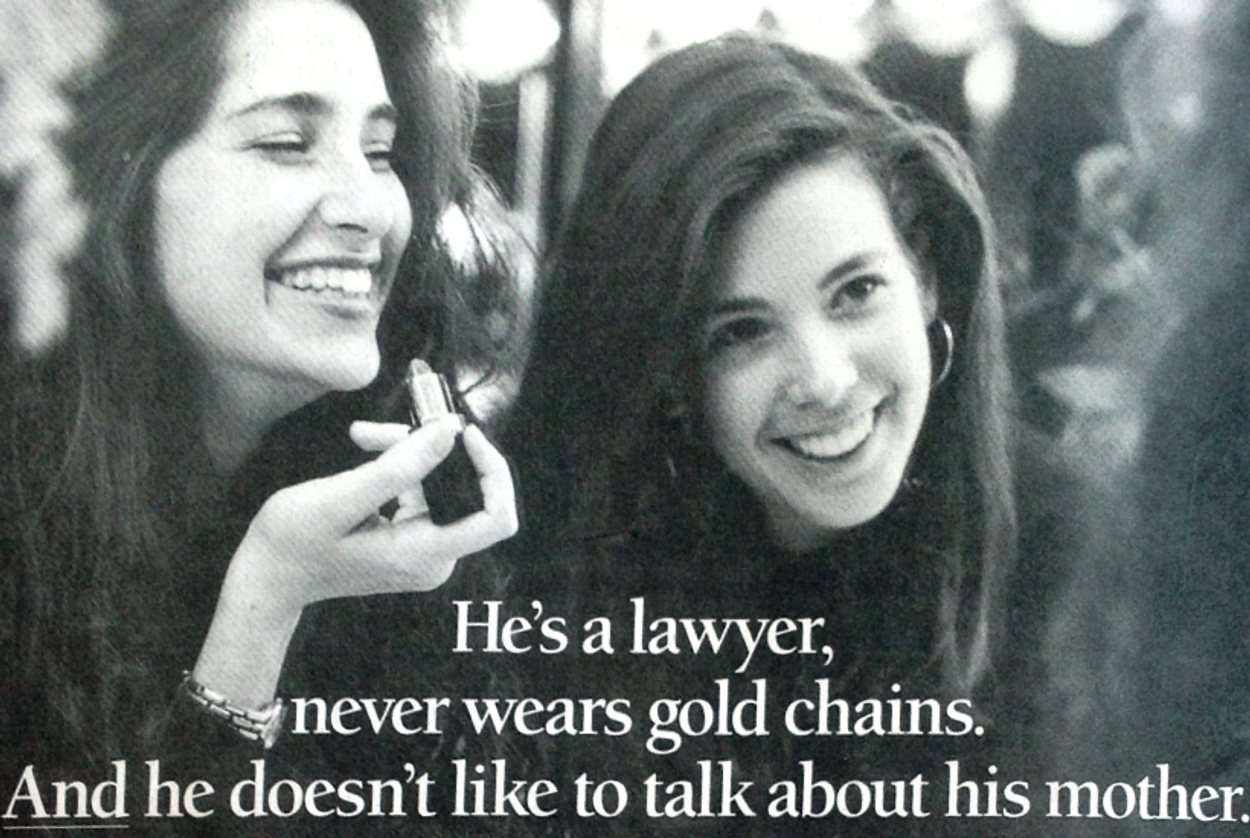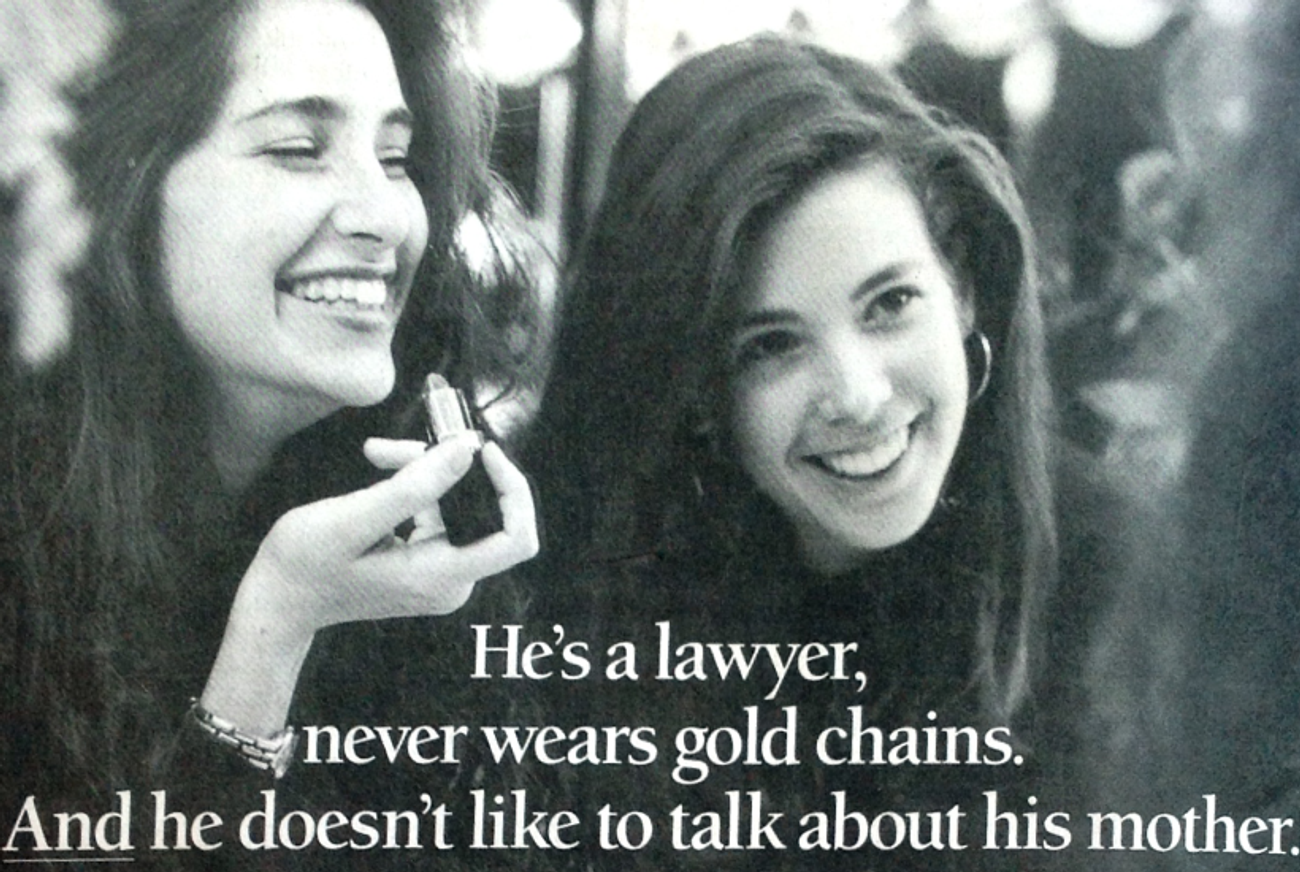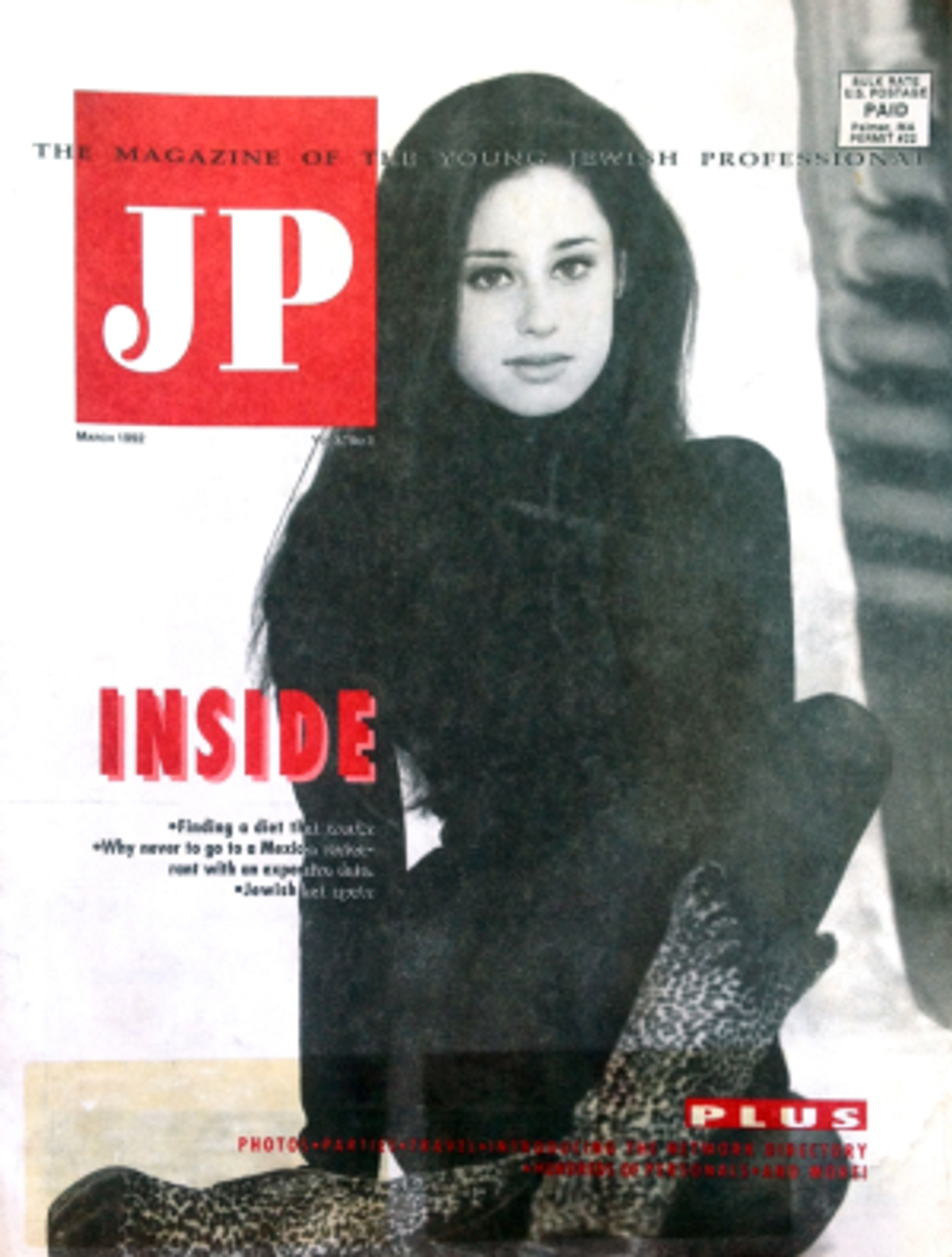Matzoball Memories
My uncle, godfather of the Jewish singles business, created a Christmas Eve tradition




For American Jews, Christmas has long been associated with two traditions: Chinese restaurants and movie theaters. On Christmas Eve 1987, a new ritual began. The Matzoball, a party for Jewish singles held on the night when it was guaranteed they had absolutely nothing else to do, has been bringing nice Jewish boys and girls together for more than 25 years. Not a small number of married couples meet at the Matzoball, which is held in 15 cities across the country, from Austin to Scottsdale. The conceit of the Matzoball is so obvious that some might wonder why an enterprising Jewish capitalist didn’t come up with the idea sooner. The enterprising Jewish capitalist who eventually did is my uncle, Andrew Rudnick.
Born and raised in Worcester, Mass., to a moderately observant family, Andy admits his reasoning for starting the Matzoball was personal. “I was desperately seeking a hot Jewish girl and I figured, ‘Why not bring them all together in one room for one night?’ ” he explained when I called him to reminisce about Matzoball history. The idea to throw a Jewish singles party on Christmas Eve, however, was not his own. In 1986, while a senior at Boston University, he attended an event at a hotel ballroom catering to young Jewish singles. Yet the atmosphere—drab lighting, bad music, stale latkes—evoked more a high-school prom than a classy evening on the town. “I couldn’t understand why the hottest nightclubs in Boston are closed tonight,” he recalled thinking. Working part-time at a then-popular club called Metro, Andy approached the owners with the idea of throwing a party aimed at otherwise bored Jewish singles. They didn’t immediately realize the potential. “Up until then, nightclubs wouldn’t even think of being open on Christmas Eve,” Andy said. The owners insisted that some outside organization sponsor the party, so that if it failed, the club’s reputation wouldn’t suffer. Immediately, Andy incorporated the Society for Young Jewish Professionals, which soon grew into a combination of “a Yenta and JDate.”
All that he needed now was a catchy name. “The Heeb Hop” and “Tribe Trot” were early contenders, but my grandmother found both of them mildly offensive (“I basically ran everything through my mother,” Andy told me). The inspiration for the title that, for countless Jews across America, would soon become synonymous with Christmas Eve has an unlikely source. Fresh out of college, while trying to hack it as a nightlife promoter, Andy worked a day job at a real-estate company run by an Irish Catholic family. “I used to get razzed by this old Irish guy who made fun of Jews for eating matzo balls, the schmuck brother-in-law of the owner,” he said. “And I had to work for this guy. Behind his back, we used to call him, ‘dem dere matzo ball.’ ” One of Andy’s friends suggested this would make a fitting moniker, and so he ran it by his mother. She gave him his blessing, and so he went back to Metro’s owners, a pair of brothers named John and Patrick Lyons, with the news that he had created a name for the party and incorporated a group to sponsor the event. The Lyonses, who are Italian, thought that some Jews might find it offensive, “like calling a party for Italians ‘The Meatball.’ ” Yet Andy assured them the party would be a success, and the Matzoball was born.
Using the marketing skills he had picked up in the nightclub business, Andy and his friends printed up posters, passed out flyers on the street, and spread the news through their networks of young Jews living in the Boston area. His penchant for exaggeration came in handy. In local radio interviews, he would say that 2,000 people were expected to turn up, even though he had sold nowhere near that many tickets. (This also didn’t please the Lyons brothers, who were only expecting 300 partygoers.) Andy took a professional risk handing out leaflets during work hours; “my boss thought I was canvassing office buildings, not the mall for Jewish girls.” Yet on the evening of the party, the expected Jewish masses turned out, “and I was able to quit my job the week after.”

Key to the Matzoball’s success, Andy said, is that it is always held at “marquee, beautiful nightclubs” and doesn’t have the atmosphere of a synagogue social. There’s “no name tags and announcements and an Israeli band, no, no, no, no.” The Matzoball’s popularity inspired Andy to enter the Jewish singles business full time, spawning a series of events aimed at young Jews under the aegis of SYJP. Festivities included “The Meet Knish,” “The Schmooze Cruise,” “The Big Tsimmis,” the Valentine’s Day “Halvah Heart,” and the Passover-themed “Let My People Go.” For a while, Andy produced a bimonthly magazine, JP: The Magazine of the Jewish Professional, which typically featured the woman he was currently dating as the cover model and personal ads inside. All of a sudden, Andy had become a nationwide impresario of the Jewish singles scene, and his friends started ribbing him as “the Jew who stole Christmas Eve.”
Andy earned not only financial rewards, but personal ones as well. He met his wife—a Russian-born Jew, with whom he now has three daughters—at the Matzoball, where she tended bar. (My suggestion that he branch out into the gay community, with a party called “Matzoballs,” went nowhere. Fortunately, another enterprising young Jew, Jayson Littman, has cornered that market.)
Andy’s success inevitably bred imitators who saw that there was a good deal of money to be made from Jews on Christmas Eve. These shysters cynically named their events after the Matzoball, choosing titles like “The Ball” or “JBall” so as to confuse newcomers to the Jewish singles scene. In the early days of this competition, my uncle told me, rival promoters would dispatch touts to stand outside Matzoball venues and hand out flyers to their events. “I literally had to hire bouncers to scare off people who were trying to steal clients,” Andy said, describing the battles he had to fight in what he terms “the Matzoball wars” of the early ’90s. Though the Matzoball has always maintained its status as the premier party on Christmas Eve, Andy was relentless in his efforts to stay on top and destroy any potential rivals. “I would do anything,” he said, including “giving free tickets to the Matzoball just to kill them and crush them. That’s the game, you got to take the wind out of them quickly.”
From the age of 6 until I graduated high school, I worked at the Matzoball. Ever the shrewd businessman, Andy employed his relatives in Boston, our hometown and the place where the Matzoball originated. He says this was because he trusted his family not to steal from him (growing up, there was always a Rudnick—usually my grandmother—manning the cash till), but I’m sure the real reason was that he wasn’t expected to compensate us. Like the Chinese dry cleaner or La Cosa Nostra, the Matzoball was family business. Sure, he would pay us kids (my brother and cousins, who usually ripped tickets, and for whom a $50 bill was manna from heaven) but certainly not my parents or grandparents, who helped their beloved brother/son by taking money at the door. One year, a man tried to obtain free entrance by assuring my mother, who was selling tickets at the entrance, that he was “Andy’s brother.” She told the startled customer that she didn’t recall growing up with him.
The Matzoball advertises itself as a party for Jews between the ages of 21 and 49, a reflection not only of the breadth of the singles market but also my uncle’s desire to attract as many customers as possible. (And it’s not just Jews who come; every year in Boston I recalled seeing at least one or two groups of Chinese who, also having nothing to do on Christmas Eve and perhaps feeling a spirit of reciprocity, arrived late in the evening.) Widening the net of potential partygoers also brings with it a set of risks. While the average age of a Matzoball attendee is in the late 20s, it is hardly unusual to see a few people, always almost men, in their 50s or 60s. My uncle refers to these types as “nebs,” short for “nebbish.”
The Matzoball’s popularity has always been due to word of mouth, and if people began hearing that the party attracts a bunch of Woody Allen and George Costanza doppelgangers, Andy worried, many potential club-goers would stay home and order in Chinese. Wanting to keep the crowd young and fresh, my uncle has tried to discourage “the nebs” from coming to his parties through “suggestive” advertising. Perhaps the bluntest form of this deterrence campaign were the cartoon newspaper ads featuring a pimp-looking character, replete with a Star of David gold chain, hanging his arms suggestively around the shoulders of two scantily clad blonde women (Jewish blondes, of course). This lothario, Andy reasoned, would intimidate the nebs into thinking that they had no chance of passing the velvet rope. My uncle’s tolerance for nebbishness is extremely low; he once accused me of being a “neb” after hearing my cell phone ring, which I had ironically set as “Hava Nagila.”
During one winter break in high school, I accepted Andy’s offer to work for him handling advanced ticket sales in the week leading up to the party. This job consisted largely of talking to nervous, late-middle-aged, single Jewish men over the phone, a chore more suited to a therapist, not a 17-year-old. One customer from New York inquired about the advertised hors d’oeuvres platter. He wanted to know how many canapés would be served, and that if he were to show up, say, around 8:30 and not 8, “would there be any left? Because if there were no hors d’oeuvres left, it would not really be worth going, right?”
“Of course,” I told him. And these people wonder why they’re still single.
I felt most sorry when the nebbishes actually showed up to the party, usually right when the doors opened. As I sat there with my blue-and-white Santa hat (“Oy to the World!” tastefully inscribed on the white furry brow) I wanted to reach out to these men through the plexiglass window, touch them sympathetically on the shoulder, and gently say, “You really should go home.” Sometimes, after having surreptitiously surveyed the dance floor filled with sweaty, gyrating twentysomethings, these men would come back to the ticket window and ask for a refund, yet once they paid their admission, I was helpless to return it.
That same high-school winter break, the day before the Matzoball, Andy got a phone call from one of his partners running the Boca Raton and Miami parties. Sitting on the other side of the office, busily entering emails into a spreadsheet, I sensed Andy’s mounting anger as he was told that the local radio station in South Florida had been accompanying Matzoball advertisements with “Hava Nagila” playing in the background, instead of the expected “high-intensity dance music” he had specifically requested. Mortified that the station had aired these promos without his prior approval, Andy immediately called the station manager. Thanks to his playing that “[expletive] bar mitzvah music,” Andy shouted, every “[expletive] nebbish in the [expletive] state of Florida” would now show up at the Matzoball.
Before Andy was through chewing the poor sap’s head off, I quickly changed my cell-phone ring.
James Kirchick is a Tablet columnist and the author of Secret City: The Hidden History of Gay Washington (Henry Holt, 2022). He tweets @jkirchick.